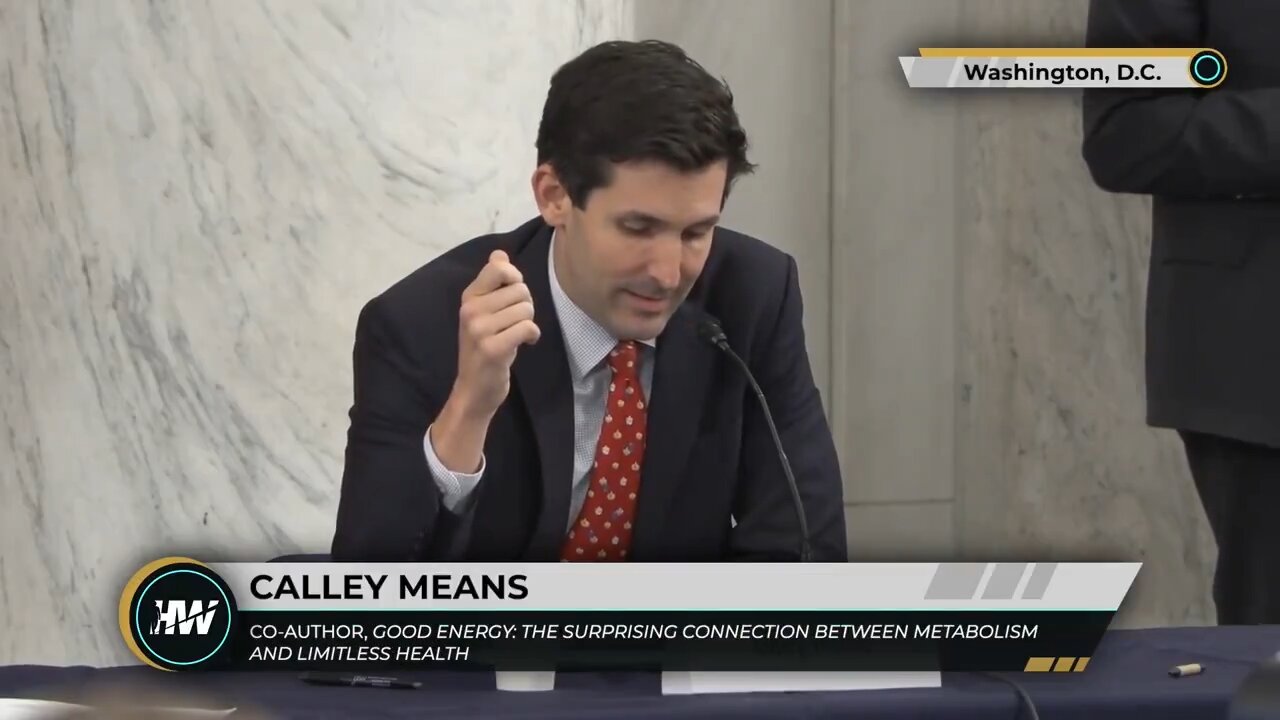Premium Only Content

⚡ Calley Means: Life expectancy has not increased in the past 100 years.
Very important presentation by Calley Means: "Life expectancy has not increased in the past 100 years. We spend 90 to 95% of all medical spending on chronic issues, and it's done nothing.
If you think about a medical miracle, it's almost certainly a solution that was invented before 1960 for an acute condition. Emergency surgical procedures to ensure a complicated childbirth wasn't a death sentence. Sanitation procedures, antibiotics that ensured infection was an inconvenience, not deadly. Eradicating polio, regular waste management procedures that helped control outbreaks like the bubonic plague, sewage systems that replaced the cesspools and open drains preventing human waste from contaminating the water.
The US health system is a miracle in solving acute conditions that will kill us right away. But economically, acute conditions aren't great in our modern system because the patient is quickly cured and is no longer a customer.
Started in the 1960s, the medical system took the trust engendered by these acute innovations like antibiotics, which were credited with winning World War II. And they used that trust to ask patients not to question its authority on chronic diseases, which can last a lifetime and are more profitable.
But the medicalization of chronic disease in the past 50 years has been an abject failure. Today we're in a siloed system where there's a treatment for everything, and let's just look at the stats. As heart disease has gone up, excuse me, heart disease has gone up as more statins are prescribed. Type 2 diabetes has gone up as more metformin is prescribed. ADHD has gone up as more Adderall is prescribed. Depression and suicide has gone up as more SSRs are prescribed. Pain has gone up as more opioids are prescribed. Cancer has gone up as we've spent more on cancer. And now JP Morgan, literally, at the conference in San Francisco recently, they put up a graph and they showed as more Ozempic is projected to be prescribed over the next 10 years, obesity rates are going to go up as more as is prescribed.
Explain that to me. Who's clapping? All the bankers were clapping like seals at this graphic.
Our intervention-based system is by design. In the early 1900s, John D. Rockefeller, using that he could use byproducts from oil production to create pharmaceuticals, heavily funded medical schools throughout the United States to teach a curriculum based on the intervention-first model of Dr. William Stewart Halsted, the founding physician of Johns Hopkins, who created the residency-based model that viewed invasive surgical procedures and medication as the highest echelon of medicine. An employee of Rockefeller's was tasked to create the Flexner Report, which outlined a vision for medical education that prioritized interventions and stigmatized nutritional and holistic remedies.
Congress affirmed the Flexner Report in 1910 to establish that any credentialed medical institution in the United States had to follow the Halstead Rockefeller intervention-based model that silos disease and to downplay viewing the body as an interconnected system. It later came out that Dr. Halstead's cocaine and morphine addiction fueled his daylong surgical resinsies and most of the medical logic underlying the Flexion Report was wrong, but that hasn't prevented the report and the Halstead Rockefeller Ingenvates brand of medicine the foundational document that Congress uses to regulate medical education today.
This is a game. We are getting sick. Nine out of 10 killers of Americans, 90% of medical costs are from a weaponized food system. It's not that complicated. When I say weaponized, I mean that literally. Our processed food industry was created by the cigarette industry. In the 1980s, after decades of inaction, the Surgeon General and the US government finally said that smoking might be harmful. And smoking rates plummeted. We listen to doctors in this country. We listen to medical leadership. And as smoking rates plummeted, cigarette companies with their big balance sheets strategically bought up food companies. And by 1990, the two largest food companies in the world were Philip Morris and R.J. Reynolds, two cigarette companies. These cigarette companies moved two departments over from the cigarette department to the food department they moved the scientists. Cigarette companies were the highest payers of scientists, one of the biggest employers of scientists, to make the cigarettes addictive. They moved these addiction specialists, world-leading addiction specialists, to the Food Department by the thousands. And those scientists weaponized our ultra-processed food. That is the problem with ultra-processed food. You have the best scientists in the world creating this food to be palatable and to be addictive.
They then moved their lobbyists over. They used the same playbook. And their lobbyists co-opted the USDA and created the Food Pyramid. The Food Pyramid was a document created by the cigarette industry through complete corporate capture and was an ultra-processed food marketing document saying that we needed to eat a bunch of carbs and sugar. And we listened to medical experts in this country. The American people, American parents, many parents who had kids in the 90s, thought it was a good thing to do to give their kids a bunch of ultra-processed food. And carb consumption went up 20% in the American diet in the next 10 years. The devil's bargain comes in in that this ultra-processed food consumption has been one of the most profitable dynamics in American history for the health care industry as we've all just been decimated with chronic conditions. The medical industry hasn't not only been silent on this issue, they've actually been complicit.
The food industry, I help funnel money from Coca-Cola to the American Diabetes Association. The truth is we need to listen to the medical system if you have an acute issue like a leg-threatening infection or broken bone, but when it comes to the chronic conditions that are plaguing our lives, we should distrust almost every institution regarding nutrition or chronic disease advice. As the panelists have described, we are in an existential moment, especially when it comes to the chronic conditions that make up 90% of medical costs. There's a slur about the American patient, Casey, on one of her first days at Stanford Medical School was told that the American patient wants to be sedentary, wants to eat ultra-processed food, that the best the medical system could do is stand with a scalpel and stand with a prescription pad and clean up the mess.
Americans do not want to be sick. I don't believe it. It's the trillions of dollars of incentives that are in the way, and we must urgently remove corruption from the USDA, the CDC, the NIH at our other medical institutions and get appropriate medical guidelines. We must renounce the Flexner Report and prioritize root cause interventions and systems thinking to reverse the chronic disease crisis."
-
 LIVE
LIVE
The Official Steve Harvey
12 days ago $4.89 earned24 HOURS OF MOTIVATION w/ STEVE HARVEY
977 watching -
 25:56
25:56
DeVory Darkins
18 hours ago $0.27 earnedTrump drops ULTIMATE BOMB on Democrat Mayors as ICE makes SHOCKING Announcement
17.9K115 -
 LIVE
LIVE
TonYGaMinG
3 hours ago🟢 ABI WITH FRIENDS | 🍩JOE DONUTS | 😶 🌫 VLADSGAMINGCARTEL |
77 watching -
 21:24
21:24
marcushouse
9 hours ago $0.06 earnedStarship Flight 10: Go or No? 🚀
8.66K9 -
 LIVE
LIVE
MrR4ger
14 hours agoSUNDAY FUNDAY w/ R4GER - VARIETY / DIABLO 4/ FOR HONOR / ETC?
92 watching -
 5:40
5:40
WhaddoYouMeme
3 days ago $0.16 earnedThey’re Calling This the End of Masculinity
11.4K13 -
 15:24
15:24
Tactical Advisor
18 hours agoBest 2011 of 2025 | Bul Armory Ultralight Pro
13.7K -
 27:31
27:31
True Crime | Unsolved Cases | Mysterious Stories
2 days ago $0.09 earnedThe Hong Kong Schoolgirl Mystery – 5 Mysterious Unsolved Cases (Part 8)
11.8K2 -
 7:19
7:19
China Uncensored
1 day agoChina is DONE in the South China Sea
10.8K26 -
 LIVE
LIVE
Joe Donuts Live
5 hours ago🟢 Loot Rats Unleashed: Arena Breakout Chaos! | Joe + Tony + Vlad
235 watching